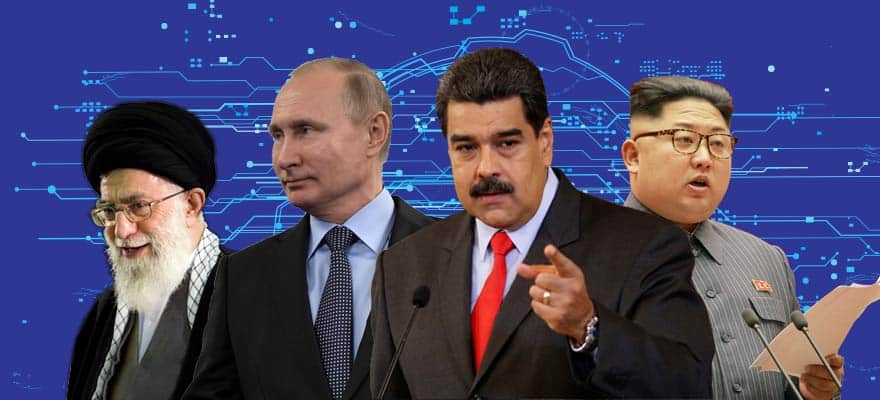This article is the third in a series of three. To read the first, click here. To read the second, click here.
It’s no secret that cryptocurrency has long been associated with criminal activity. Now, some governments and officials have been connected to crypto usage for illicit activities of their own--while some are clearly illegal, others are operating a bit closer to the border of the law.
In any case, those who hold major power in the world don’t see crypto as it was intended to be seen--a tool for bringing power to individuals. Rather, they see it as a possible instrument to gain more power--but will they be successful?
Russia Wants a Centralized Crypto to Track Usage--But It Just Isn’t Possible
The Russian government has had a long and complicated relationship with cryptocurrency, one that has involved more than a few contradictory statements--talk of outright bans, the embrace of blockchain, and the encouragement of crypto mining operations have all entered the story at different times.
Throughout Russia’s crypto drama, however, one thing has remained fairly consistent--the concept of the CryptoRuble, a Russian state cryptocurrency that will be issued by authorities.
Although the concept of the 'BitRuble' was originally discussed in 2015, the Russian government didn’t take up the subject of the CryptoRuble again until August of 2017, when Russian news source RT reported that First Deputy Prime Minister Igor Shuvalov spoke of Russia’s plans for developing a Blockchain -based coin of its own.
A few months prior to Igor’s statements, Russian Ethereum representative Vladislav Martynov told RT that “in five years Russia could become a global center for blockchain expertise. The country plans to attract and teach programmers blockchain technology and then offer the world expertise.”
In talks about the CryptoRuble, Glazev stated his interest in using the blockchain as a way to gather information about its users: “[the CryptoRuble would be] the same ruble, but its circulation would be restricted in a certain way.”
Indeed, Business Insider reported that the CryptoRuble will not be mined as regular Cryptocurrencies are, but instead “issued and tracked just like regular currencies.” At the time, the Russian government gave no indication as to whether the CryptoRuble would be issued by the Russian central bank or by smaller, commercial banks; exactly who would be eligible to use the CryptoRuble is also unknown.
However, Russia’s intentions to build a centralized cryptocurrency may have been ill-informed. Finance Minister Anton Siluanov recently wrote a letter to President Putin stating that the creation of a centralized state cryptocurrency may be impossible given the fact that cryptocurrencies are decentralized by nature. “Cryptocurrencies are based on decentralized ledger technologies,” the letter reads.
Siluanov also wrote that his ministry would not be opposed to the CryptoRuble as a private project under the supervision of financial authorities, but rejects the idea of the use of “public funds” in a state cryptocurrency.
The letter also advised against using a state cryptocurrency for military-related expenses, saying that the blockchain may make such transactions traceable--which (surprise, surprise) the Russian government may find unattractive.
Russian Oligarchs: Crazy for ICOs?
Although cryptocurrency was originally developed as a way to keep money out of the hands of big banks and to empower individuals, in some circumstances, crypto is used as a tool for making the rich richer.
At one point in the midst of the Russian crypto saga, Moiseev announced that the Russian government was planning to ban cryptocurrency sales to ‘ordinary investors’. Although the statement was made in August of 2017 and no such ban has been enacted, there’s one group of Russians that likely would not have been affected--and they’ve bought into crypto in a big way.
Rumours circulated that four Russian oligarchs were significant participants in the much-hyped billion-dollar Telegram ICO; three of them were named on the Trump administration’s list of 114 Russian politicians and businessmen who have been classified as ‘oligarchs’.
Reports have also emerged that some other alleged oligarchs (Roman Abramovich, Aleksandr Frolov and Aleksandr Abramov) may be investing large amounts of money into ICOs through a European fund known as ‘Blackmoon Crypto', a subsidiary of Blackmoon Financial.
At Any Cost: North Korea's Efforts to Acquire Crypto
At a news conference, Bossert connected the WannaCry attack with North Korea’s larger pattern of erratic, destructive behavior: “I think, at this point, North Korea has demonstrated that they want to hold the entire world at risk, whether it be through its nuclear program or cyber attacks.”
In January of 2018, cybersecurity experts warned the world that North Korean hackers had been targeting Bitcoin holders and exchanges all over the world.
The attacks reportedly began with a malware campaign that mainly targeted South Korean Bitcoin wallets in late 2017. However, in a report by The Independent, cybersecurity firm Recorded Future said that as the South Korean government tightened its grip on crypto, “exchanges and users in other countries should be aware of the increased threat level from North Korean actors.”


















